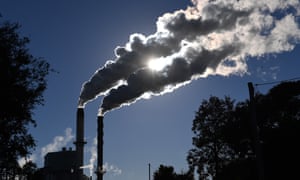Germanwatch says assessment that ranked Australia last or near last was based on scientific criteria and data
• Scott Morrison says climate change report isn’t credible
• Scott Morrison says climate change report isn’t credible
An author of an international report that found Australia was ranked last or near last on a range of climate change
measures has rejected Scott Morrison’s claim their work is not
credible, saying the assessment was based on scientific criteria and
official data.
Germanwatch, a non-government organisation and one of the authors of the 2020 Climate Change Performance Index, said the rankings were developed using an independent monitoring tool that had a detailed and transparent methodology.
The tool looks at national climate action across greenhouse gas emissions, renewable energy, energy use and policy. Australia was ranked as sixth-worst of 57 countries across the four categories.
At a press conference on Thursday, Morrison said he completely
rejected the index. Asked why, he said: “I don’t think it’s credible.”Germanwatch, a non-government organisation and one of the authors of the 2020 Climate Change Performance Index, said the rankings were developed using an independent monitoring tool that had a detailed and transparent methodology.
The tool looks at national climate action across greenhouse gas emissions, renewable energy, energy use and policy. Australia was ranked as sixth-worst of 57 countries across the four categories.
In a statement, Ursula Hagen, a policy adviser with Germanwatch, rejected Morrison’s rejection. She said the index had been published since 2005 and was an independent monitor of climate protection performance. It used standardised scientific criteria and drew on official statistics for 12 of its 14 indicators.
She said experts, including from Australian non-government and environmental organisations, found the country’s performance had declined at both national and international level since the election.
The report was published to coincide with the UN climate conference in Madrid. With one scheduled day of negotiations to go, observers doubted the conference would lead to agreement on the rulebook for the Paris agreement and expected negotiations to drag into the weekend. At dispute is what is known as Article 6, which governs the use of carbon markets.
Australia is fighting to remove from the text a proposed ban on the use of carryover credits from the Kyoto protocol. At least 100 countries support a ban. An analysis by science and policy institute Climate Analytics found there was no legal basis to use Kyoto protocol credits under the Paris agreement as they were separate treaties. It found neither deal included wording to suggest they should be linked.
Officials told Senate estimates earlier this year that Australia was the only country planning to use them.
Australia strongly opposes a ban and has factored in 411m tonnes of credits, which it describes as “overachievement”, as necessary for it to meet its Paris commitment.
The Climate Analytics report, commissioned by the Australia Institute, said Australia’s claim to carryover credits was linked to Australia having massive emissions from deforestation in 1990, the year against which targets under the Kyoto deal are measured. Deforestation declined markedly in the years that followed, allowing Australia to increase fossil fuel emissions and still beat its first Kyoto target.
The report says it would be perverse for Australia to be rewarded in 2030 for the existence of large-scale deforestation four decades earlier.
It says the credits also resulted from Australia’s decision to give itself targets that were far less ambitious than other countries: an 8% increase in emissions between 1990 and 2010, and what was equivalent to just a 0.5% cut below 1990 and 2020 (expressed as a 5% cut below 2000 levels).
The emissions reduction minister, Angus Taylor, left the conference on Wednesday, leaving negotiations to a delegation of officials from the Department of Foreign Affairs and Trade led by environment ambassador Jamie Isbister.

No comments:
Post a Comment